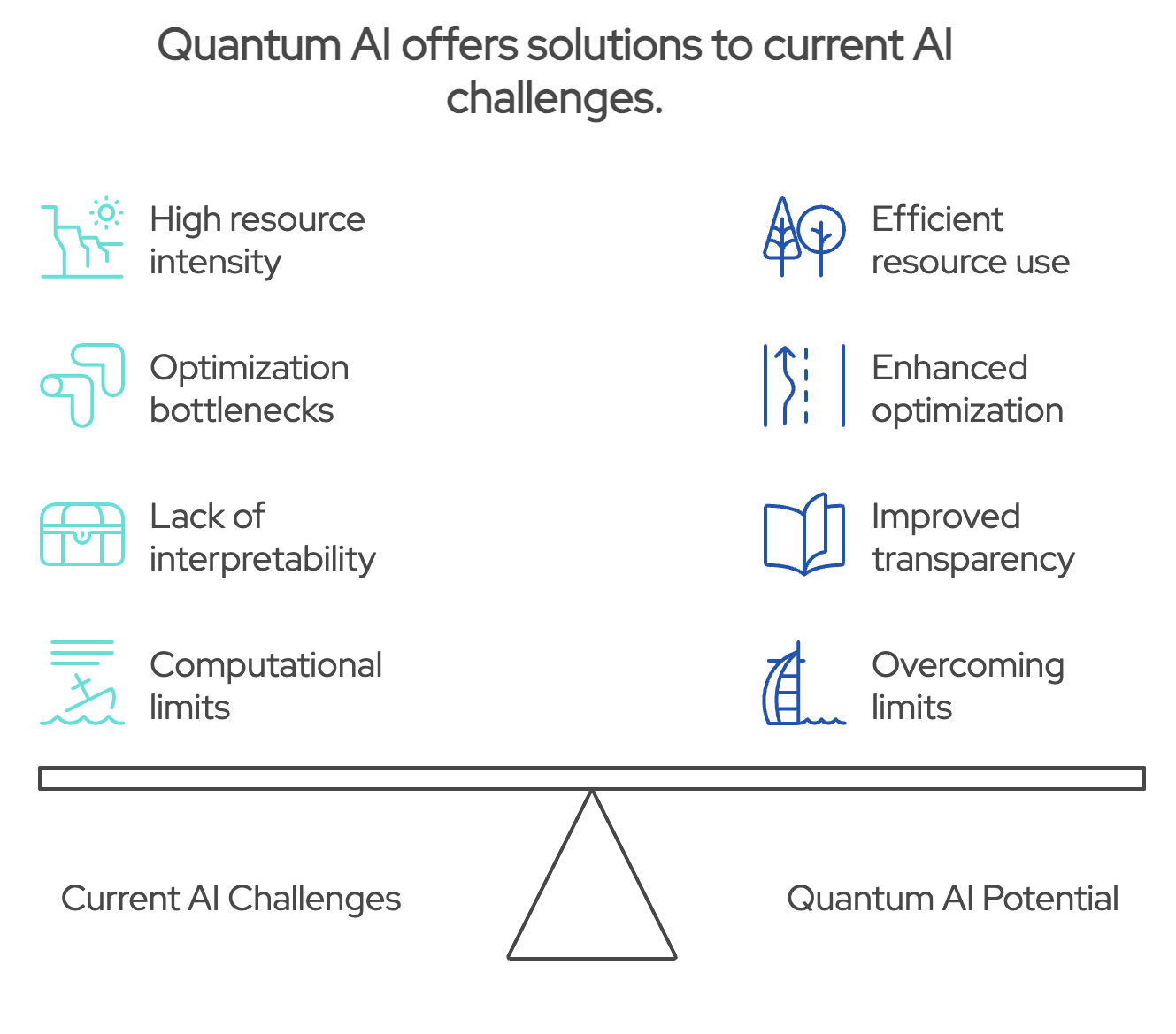We live in an era where technology is evolving faster than ever, shaping the way we work, think, and innovate. One of the most exciting frontiers is the combination of Quantum Computing (QC) + Artificial Intelligence (AI) = Quantum AI, a powerful duo that can redefine computing as we know it.
Everyone is talking about merging the two technologies but what does it actually mean?

AI enables machines to learn, make decisions, and recognize patterns. Quantum computing leverages the principles of quantum mechanics to process information in ways that classical computers cannot, making problem-solving faster and more accurate. Imagine AI that can process information at lightning speed or quantum computers that become more stable and efficient thanks to AI-driven improvements. AI can help make quantum systems more reliable, reducing errors and fine-tuning performance. At the same time, quantum computing has the potential to supercharge AI, offering new ways to train models, optimize algorithms, and tackle complex problems that are beyond the reach of today’s computers.
But how does this work in practice? Let’s have a look at the background of both technologies.
AI has its roots in the 1950s when researchers first started exploring how machines could simulate human intelligence. Early AI systems were rule-based and had limited capabilities.
The rise of machine learning in the 1990s and deep learning in the 2010s brought AI into our daily lives, enabling breakthroughs in speech recognition, image processing, and natural language understanding. The recent advancements in AI have been mainly driven by hardware improvements (better GPUs), which enabled for example the training of LLMs.
While there have been many recent breakthroughs, AI still has significant challenges to overcome:

Quantum computing has the potential to address some of these bottlenecks. But to understand how, let’s take a brief look at the history of quantum computing.
Quantum computing is based on the principles of quantum mechanics, a field of physics that studies the behavior of particles at the smallest scales.
Unlike classical bits (which are either 0 or 1) used in the computers we all know today, quantum bits or qubits can exist in a state of superposition, meaning they can be both 0 and 1 simultaneously. Entanglement allows qubits to correlate in ways that classical bits cannot. Putting it in simple terms, quantum computers have the potential to compute complex problems much faster compared to classical computers.
The idea of a quantum computer was first proposed in the 1980s, but practical developments have only gained momentum in recent years. Companies like IQM Quantum Computers are building quantum computers that strive to outperform classical computers in specific, complicated tasks like optimizing routes or discovering new drugs.
Outperforming a classical computer on a commercially viable task is called quantum advantage. As of today, we are still in the proof-of-concept phase and have not reached quantum advantage yet. However, the progress in quantum computing has been accelerating in the past decade though. IQM has demonstrated its roadmap to reaching this state as early as 2030. First quantum computers are still far from replacing classical systems for most applications, but the potential is almost within our reach.
Quantum is getting integrated into high-performance computing centers where it works with supercomputers in a hybrid approach. Even though we are still in the early days of quantum computing, the first wave of industrial adoption is happening right now.
With quantum advantage on the horizon, many companies have started exploring AI use cases. Quantum computing could revolutionize AI by tackling some of its biggest challenges. If you want to see a real-life use case on how Siemens was able to leverage quantum + AI for optimizing their polymer reactor, check out this post.
Here’s how:
However, the relationship is not one-sided, AI can also help advance quantum computing.
AI has the power to make complex systems work better and faster. It can help optimize performance using machine learning (ML) and drive innovation through generative AI. Our goal at IQM is to use these AI tools to stay ahead of the market and offer superior products to our customers. Here are some key areas we’re currently focusing on:
AI in Auto-Calibration
We’re using AI to make quantum computers easier to use and maintain by applying machine learning in calibration routines. This means:
Machine Learning for Error Correction and Mitigation
AI can improve how quantum computers detect and fix errors, leading to:
In fault-tolerant quantum computing, extra qubits are used to protect information and correct errors. This process relies on decoders, software that identifies and fixes mistakes. The most precise decoders today are AI-powered, and we plan to develop them for our fault-tolerant IQM quantum computers.
Optimizing Quantum Algorithms with AI
Running useful quantum applications requires optimizing how quantum operations are mapped onto the hardware. AI can help by designing smarter transpilers, software that efficiently translates industrial-use quantum algorithms into operations that work best on IQM’s quantum computers. This will make quantum computing faster and more practical for real-world applications.
AI for Quantum Error Mitigation (QEM)
One of the biggest challenges in quantum computing today is dealing with noise, which causes errors in calculations. Quantum Error Mitigation (QEM) helps reduce this noise, but existing methods are slow and require running many extra circuits, making them impractical for large-scale use.
We propose using deep learning models, like transformer models, to predict and correct errors in quantum computations. This AI-driven approach could dramatically speed up quantum algorithms by handling error correction before the user even runs their computations. Since IQM has access to vast amounts of quantum data, we can train AI models to improve error correction more effectively than ever before.
IQM’s Noise-Robust Estimation (NRE) method has already outperformed traditional error-mitigation techniques, and AI could take it even further by fine-tuning hyperparameters automatically. This would improve accuracy and reduce the workload for users.
AI in Chip Design
AI can also help improve the quality and performance of our quantum processing units (QPUs), directly benefiting our customers.
Fault-tolerant quantum computers rely on special error-correcting codes, which influence the design of the quantum processor. Many different codes exist, but only a few are well understood in terms of efficiency. AI can help discover better error-correcting codes that minimize the number of qubits needed and reduce computation time, creating a direct feedback loop between chip design and code development.
By integrating AI into every step of quantum computing, from hardware to error correction to algorithm optimization, we can push the boundaries of what’s possible and deliver the best quantum computing experience to our customers.
These mutual benefits bring us to an important question: Is Quantum AI real today, or is it still a futuristic dream?
While large-scale, fully operational quantum and AI models are not yet a reality, early-stage applications are already being explored on many fronts. Hyperion Research predicts that 18% of quantum algorithm revenue will come from AI by 2026. Several companies and research institutions are investing heavily in Quantum AI:
The future of Quantum and AI depends on several key advancements:
Despite the challenges, the momentum behind Quantum AI is growing. Seeing larger organizations exploring this field and first milestones being achieved indicates that Quantum AI could redefine industries, from healthcare to finance to materials science.
“We expect the first significant breakthroughs in Quantum AI to emerge by the end of this decade and the beginning of the next, as we transition from today’s noisy quantum devices to error-corrected quantum computers with tens to hundreds of logical qubits. These machines will allow us to move beyond purely experimental NISQ quantum algorithms, unlocking practical and potentially unexpected advantages for AI applications.
Just as AI research exploded once high-performance computing became widely available, we anticipate that Quantum AI will experience a similar inflection point as scalable, fault-tolerant quantum hardware becomes reality.” Dr Ines de Vega, Head of Quantum Innovation at IQM, summarizes.
The fusion of Quantum Computing and AI has the potential for a massive impact on the world. Quantum and AI together could solve problems that classical computers cannot, making AI more efficient, faster, and more powerful. While we’re still in the early stages, the progress in both fields suggests that this is more than just a theoretical concept.

Emilia Stuart is a content strategist and storyteller at IQM Quantum Computers, specializing in translating complex quantum computing concepts into engaging narratives. With a background in research and tech marketing, she understands potential customers and crafts stories that resonate. Emilia’s passion is making intricate technologies accessible to diverse audiences.
Search faster—hit Enter instead of clicking.